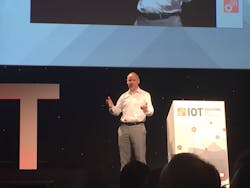In my first report from the Industrial Internet Consortium’s IoT Solutions World Congress 2016, I noted the prevalence of Internet of Things (IoT) discussions around specific technologies and, increasingly, technology partnerships. But several keynotes at the event highlighted the fact that the IoT is about much more than technology.
Chief among these was a presentation by Derek O’Halloran of the World Economic Forum (WEF), who said the WEF anticipates the Fourth Industrial Revolution, at the core of which the IoT sits, as being the organization’s primary focus “for the next several years, because it’s about the integration of digital, physical and biological systems. The Fourth Industrial Revolution will impact operational models, business models, industry structures and the structure of the economy itself."
Referencing a survey conducted of heavy industry executives, O’Halloran illustrated how trends around IoT are not just being promoted by technology companies — but realized by the companies being affected. Results of the survey showed that 72 percent of respondents think IoT will be disruptive to their industry, and 78 percent of those think it will be disruptive within five years.
Somewhat disturbingly, 88 percent of respondents said they don't think their company is ready for the change.
“This is the first time leaders in heavy industry don't see a big technology change as taking place over decades, but within 5 years,” said O’Halloran. “The media, entertainment and information industries have already been turned around significantly by the Internet, but big industries like finance, manufacturing and retail have only been affected a little to date. This means the changes we’ve seen so far are just the beginning, the appetizer; the main course is yet to come.”
With potential impacts this far-reaching, we have to start asking if we have the right institutions, i.e., government, in place to adapt to these changes. “After all, we’re still seeing the impacts from the first industrial revolution today,” O’Halloran pointed out. Kids have a summer break from school based on the fact that they used to help work in the fields over the summer;” but the impact of that change still remains in place.
Continuing on the theme of the need for government adaptation to a trend as big as the fourth industrial revolution, Matthias Machnig, state secretary of the German Federal Ministry for Economic Affairs and Energy, said “Industry 4.0 only works if we have law 4.0, but we’re probably only on law 2.5.”
The result of this disconnect between industry advances and those in government is that unfair competitive circumstances are proliferating, said Machnig. “We don't accept it if a company has a market share of 95 percent. We call that a monopoly. But we have that happening in some technology areas,” he said. “We want competition, so we need level playing field.”
Because economic success in Industry 4.0 is “not just about physical products, but data, there are data security and privacy conflicts that the law will have to address,” Machnig added.
In contrast to O’Halloran’s WEF survey data showing that most companies are aware of and trying to plan for the big changes IoT will bring, Machnig noted that 50 percent of small to medium sized companies in Germany say digitization is not a top priority for them. “We need to change that perception because their competitiveness will depend on it,” he said.
Despite the concerns stressed by O’Halloran and Machnig, both contend this next industrial revolution is just as manageable as the previous ones.
“The past three industrial revolutions needed shaping, so too will industry 4.0,” said Machnig, adding that this topic will be key to Germany’s role as host of the G20 Summit in 2017. “No one in this room knows exactly what’s going to happen in next 10 years because of the huge, dynamic innovations surrounding IoT. The question before us is how to manage it.”
Leaders relevant to this article:


